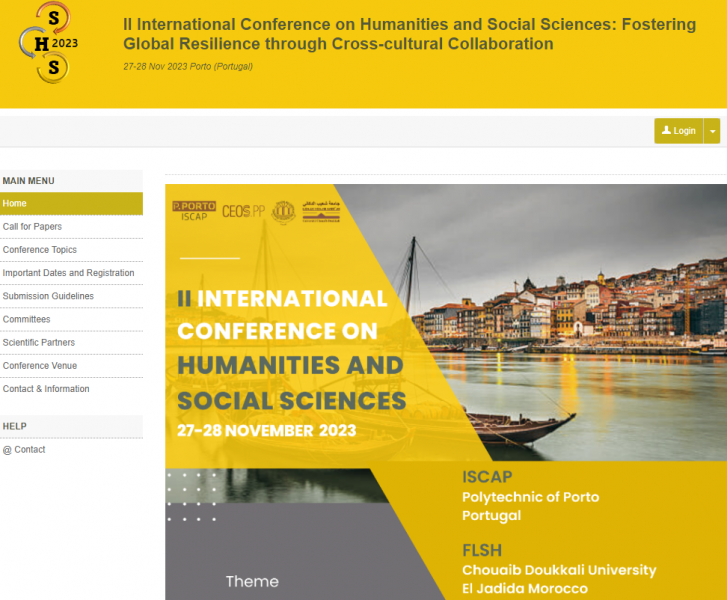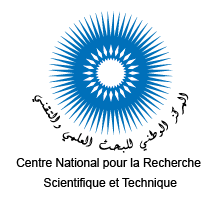Humanities and social sciences

Venue: ISCAP Business School Porto Portugal | المدينة: Porto, PORTUGAL
CALL FOR PAPERS
Humanities and social sciences (HSS) fields play a vital role in enhancing cross-cultural understanding through their significant components such as history, language, arts, literature, economics, sociology, public opinion, and other related disciplines. Through mutual understanding and cross-cultural collaboration, the HSS sciences can contribute to addressing contemporary world challenges, grasping emerging opportunities, and building global resilience. HSS research and reflections are needed, now more than ever, to facilitate multicultural collaboration and strategic planning for recovery, to enhance resilient educational and research systems, to ensure intercultural and reflective dialogue, and to promote creative initiatives for solidarity, diversity, and community healing.
Collective resilience and global leadership have been challenged over the past few years as leaders have faced global conflicts, climate change, globalization, the rise of misinformation, and the Covid-19 pandemic. They found themselves in the position of adopting leadership that is reactionary or progressive vis-à-vis factors of social and political unrest, financial crises, supply chain issues, lack of a sufficient workforce, human capital issues, and increased competition. Indeed, fostering global resilience in such a multi-crisis world requires cross-cultural innovative leaders who can face volatility, uncertainty, complexity, disruptions, and ambiguity. Particularly, today’s leadership requires cultural empathy and diversity that entails responsiveness, engagement and understanding of local cultures (through international projects, training, exchanges, and collaboration worldwide). Innovative thinking is another in-demand skill for a creative and entrepreneurial spirit where adaptability and agility are important to initiating and realizing new ideas. This cannot be achieved without transparency, knowledge-sharing, and interactive communication processes with easy access to information and resources. Hence, a blended collaboration with digital platforms and tools that adapt to diverse languages and communication practices is needed.
Advancing global resilience also requires creating sustained equitable education and resilience-enhancing educational contexts and systems. There is a particular need to empower youth to effectively deal with obstacles such as the Covid-19 pandemic, conflict and forced displacement, migration, and hate crime. This requires a meaningful and balanced education for youth growing up in unfavourable circumstances. Moreover, today’s university curriculums need to be restructured towards a green economy and sustainable development; this will require key transferable skills such as digital literacy, critical thinking, problem-solving, collaboration and risk management that are critical for employment in a sustainable society. Multilingualism and intercultural competencies are other significant tools towards extending students’ international perspectives and accelerating the process of multicultural interaction. Indeed, strengthening resilience on a global scale requires further dedication to multi-and interdisciplinary research, internationalization of the curriculum, close coordination and cooperation with public and private sector practitioners, and the development of new experiential education programs fit for the next generation of leaders.
In the context of higher education, researchers and practitioners in the humanities and social sciences can explore how interdisciplinary study and collaboration may create a more equitable system worldwide. For instance, universities can devote more energy and funding to partnerships that promote sustainability across campus and in wider and even global capacities. Academic librarians should seek partnerships around the world to facilitate equitable access to information and publishing. Curricular design in both social sciences and humanities should be attuned to creating knowledge that prioritizes equity, diversity, and inclusion. Instructors ought to work on imparting data literacy and research skills to create independent, lifelong learners.
At the level of arts and humanities, there is a growing need for cross-cultural dialogue to develop sustainable solutions to global concerns. Cross-cultural dialogue can be a life-changing form of communication with the power to increase connections, solidarity, and trust across all layers of society. Dialogue can take place through engaging and responsible media that plays a greater role in shaping the mindset of society towards a proactive, rather than a reactive approach to deal with crises and pave the way for a more peaceful, inclusive, and resilient future. Cross-cultural dialogue and community resilience can also occur through creative arts that can help understand how artists, cultural workers, and designers inspire and strengthen the capacities of communities to respond creatively to crises. In fact, arts and cultural events initiatives can help communities make sense of the world issues like climate change, economic inequalities, and rapid technological change. Arts can connect communities that are experiencing hardship, historic oppression, or other challenges and, thus, help them heal.
Hence, the objective of this conference is to highlight the importance of the Humanities and Social Sciences and promote their role in fostering global resilience through cross-cultural collaboration and response to current global issues. Thanks to their interdisciplinary nature, HSS sciences can produce multi-dimensional and forward-looking research to understand the ongoing transformations and to shed light on the public policies put in place to address contemporary world challenges. Thus, the conference is an opportunity for academics and professionals with cross-disciplinary interests to share the latest research findings and new ideas (theoretical and practical) related to the cross-cultural contributions of HSS in addressing global issues. The main goal is to contribute to the realization of a sustainable and inclusive development model.
CONFERENCE TOPICS
The Topics of interest include, but are not limited to, the following:
Management, Economics, Cultural and Creative Industries:
- Development Trends,
- Global Innovation and Sustainability,
- Digital Transformation and AI,
- Performance Measurement and Organizational Resilience,
- Social Enterprises,
- International Management,
- Creative Economy and Resilience.
Arts, Humanities and Social Sciences:
- Artistic and Cultural Resilience,
- Media Discourses and Cross-Cultural Dialogue,
- Communication Arts and Sustainability,
- Sociology and Global Relations,
- AI and Human Consciousness,
- Social Theories and Digital Society,
- Well-being in a High-tech World,
- Psychological and Social Resilience,
- Digital Humanities and Community Resilience.
Education and Research:
- Inclusive and Equitable Digitalization,
- Cross-cultural and Inclusive Pedagogies,
- Internationalization and Cooperation,
- Academic Freedom around the World,
- International Library Partnerships,
- Data Surveillance and Extraction,
- Information Literacy,
- Open-Access Publishing and Equity.
SUBMISSION GUIDELINES
Submissions must be sent to عنوان البريد الإلكتروني هذا محمي من روبوتات السبام. يجب عليك تفعيل الجافاسكربت لرؤيته. and contain the following information:
- Presenter(s) name(s).
- Affiliation and a contact e-mail address.
- Title of the presentation.
- Topic in which you would like to be included.
- Abstract in the language of the presentation (250-300 words) + up to 5 references.
- A short summary of your abstract (max. 150 words) in English (if the language of the presentation is not English) or in another language of your choice from the Conference languages.
- Three to five keywords.
- Biographical note(s) of the author(s) in English (80-100 words).
CONFERENCE LANGUAGES
English, Portuguese, French
PUBLICATION OPPORTUNITY
- Accepted papers will be published as conference proceedings.
- Selected papers will be submitted for publication in the partner journals, according to their submission guidelines.
CONFERENCE VENUE
Porto Accounting and Business School (ISCAP)
Polytechnic Institute of Porto R. Jaime Lopes Amorim s/n,
4465-004 São Mamede de Infesta Portugal
CONTACT & INFORMATION
- Prof. Alexandra Albuquerque,
CEOS-PP, ISCAP, Polytechnic of Porto, Portugal.
عنوان البريد الإلكتروني هذا محمي من روبوتات السبام. يجب عليك تفعيل الجافاسكربت لرؤيته.
- Prof. Karima Bouziane,
FLSH, Chouaib Doukkali University, Morocco.
عنوان البريد الإلكتروني هذا محمي من روبوتات السبام. يجب عليك تفعيل الجافاسكربت لرؤيته.
Powered by iCagenda
